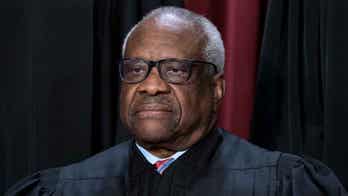Wasserman Schultz defends her IT aide
Washington Examiner chief political correspondent Byron York on Rep. Debbie Wasserman Schultz (D-FL) defending her decision to keep her IT aide on the payroll while under investigation.
A federal judge in Florida has thrown out a class-action lawsuit led by Sen. Bernie Sanders supporters who accused the Democratic National Committee of “being in cahoots” with Hillary Clinton -- but only after the DNC's legal team argued they had no obligation to adhere to a fair nominating process.
While the case is dead for now, it's also bolstered critics who say the DNC had a bias in favor of Clinton last year.
According to court documents, DNC attorney Bruce Spiva argued in the case that the party has broad discretion in how they pick their nominee.
"We could have voluntarily decided that, 'Look, we're going to go into back rooms like they used to and smoke cigars and pick the candidate that way.' … They could have. ... And it would drag the Court well into party politics, internal party politics to answer those questions," he said, according to a transcript of an April 25 hearing, in U.S. District Court for the Southern District of Florida.
The case, in which Sanders supporters sought a refund and other recourse, was dismissed Friday.
Judge William Zloch, in granting the defendants’ motion, said in a 28-page opinion that the plaintiffs -- including Sanders’ supporters who donated to the DNC -- failed to show “concrete injury … traceable to the DNC and its former chair,” as a result of their candidate losing the nomination to Clinton.
FEDS ARREST IT STAFFER FOR WASSERMAN SCHULTZ TRYING TO LEAVE COUNTRY
The 35-page case, filed last summer, is based largely on published quotes from then-Democratic National Committee Chairwoman Rep. Debbie Wasserman Schultz and hacked DNC emails that suggest she and her staff sought to undermine Sanders, a Vermont independent who joined the party to run for president in 2016.
While none of the hundreds of emails were specifically cited in the suit, published emails show DNC efforts to limit the number of primary debates -- seen as a bid to help Clinton -- and possible attack strategies on Sanders.
They were made public at the start of the 2016 Democratic National Convention last July, which forced Wasserman Schultz, of Florida, to resign.
One of the quotes cited in the case was Wasserman Schultz, a co-defendant with the DNC in the case, telling Politico in 2015, as potential candidates were emerging: "I count both Secretary Clinton and Vice President Biden as dear friends, but no matter who comprises our field of candidates it's my job to run a neutral primary process and that's what I am committed to doing."
WASSERMAN SCHULTZ UNDER PRESSURE TO TESTIFY ON EX-IT AIDE
Lawyers in the case cited parts of the DNC's charter and bylaws, which state the DNC chairperson “shall exercise impartiality and evenhanded-ness as between presidential candidates and campaigns” and ensure the same for the group’s staff and national officers. But Zloch wrote in his opinion that the DNC viewed this commitment as "a mere political promise -- political rhetoric that is not enforceable" in the federal courts.
“If you had a charity where somebody said, ‘Hey, I'm going take this money and use it for a specific purpose, X, and they pocketed it and stole the money, of course that's different,” Spiva had argued.
“But here you have a party that's saying, ‘We are going to, you know, choose our standard bearer, and we're going to follow these general rules of the road, which we are voluntarily deciding.”
Spiva, a lawyer with the Washington, D.C., firm Perkins Coie, did not return a call Wednesday seeking comment.
“This case, in short, involves allegations that the Democratic National Committee was in cahoots with the Clinton campaign and sought to tip the scales in her favor in the Democratic primary,” Zloch wrote, in dismissing the case.
He also dismissed the case on other legal grounds, including one related to where some of the plaintiffs live, saying federal courts have only “limited jurisdiction.”
Elizabeth Lee Beck, an attorney for the plaintiffs, told Fox News that she must consult with other members of the legal to team before deciding on a possible next step.
“I try to see the silver lining,” she said. “Like all lawyers, you do the best you can.”





